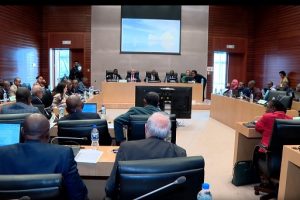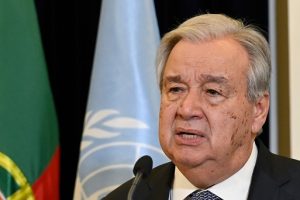
Despite contributing a mere 4 percent of global greenhouse gas emissions, the African continent faces some of the most severe consequences of climate change. Rising temperatures, erratic rainfall patterns, prolonged droughts, and devastating floods have become common in many parts of Africa, placing unprecedented stress on food and water security, public health systems, and infrastructure. These challenges demand urgent, sustained, and well-financed responses. As world leaders, policymakers, and stakeholders prepare for the Second Climate Finance Summit to be held in Ethiopia, the spotlight is on climate financing, how much is needed, how it is allocated, and what mechanisms can effectively channel resources to Africa’s most vulnerable regions.
Vilakati, a prominent voice in Africa’s climate advocacy space, signaled that the scale of the challenge and the urgency of action. “Although Africa contributes just 4 percent of global greenhouse gas emissions, it bears the brunt of climate change’s consequences,” he said. “The continent is facing unprecedented threats to food and water security, public health, and critical infrastructure.” His words reflect the sentiment shared by many across Africa who witness the tangible effects of climate change daily—failing crops, dry rivers, collapsing homes, and communities displaced by climate-induced disasters, local media reported.
At the heart of the upcoming summit is the persistent and growing climate finance gap. Africa needs an estimated 250 billion US dollars annually to finance climate adaptation and mitigation efforts. These funds are essential for implementing climate-smart agriculture, renewable energy projects, reforestation programs, disaster risk reduction strategies, and infrastructure upgrades that can withstand climate impacts. However, the continent currently receives only around 30 billion US dollars annually—just a fraction of what is required. This shortfall not only undermines Africa’s ability to respond to immediate climate threats but also hinders long-term development and resilience-building efforts.
The financial disparity is not just a numbers issue—it’s a matter of equity and justice. African nations, having contributed least to the climate crisis, are bearing disproportionate burdens. For decades, African leaders and civil society organizations have called on industrialized nations—whose historical emissions have fueled global warming—to meet their commitments under international agreements such as the Paris Accord. Central to these demands is the call for developed nations to deliver on their pledges of climate finance, technology transfer, and capacity building.
Vilakati emphasized the need for bold, innovative, and cooperative approaches to bridge the financing gap. “We cannot continue with business as usual,” he stated. “We must find new funding mechanisms and foster global cooperation to address this massive financing gap.” Indeed, traditional grant and loan mechanisms have proven insufficient, often bogged down by bureaucratic hurdles and political reluctance. The summit in Ethiopia aims to rethink climate finance from the ground up, pushing for blended finance models that combine public funds, private investment, and philanthropic capital. This could include green bonds, carbon markets, and results-based financing approaches that reward measurable progress in climate resilience and emissions reduction.
The summit is expected to bring together heads of state, finance ministers, climate negotiators, international donors, private sector leaders, and representatives from multilateral institutions like the African Development Bank, the United Nations, and the World Bank. This high-level dialogue is essential for aligning national, regional, and global climate priorities with the realities on the ground. Vilakati, speaking ahead of the summit, noted, “The summit will foster high-level dialogue and action to support Africa’s transition toward a climate-resilient and green development pathway.”
The location of the summit-Ethiopia-is symbolically significant. As a country with a strong commitment to climate action and green development, Ethiopia has pioneered reforestation efforts, clean energy investments, and sustainable agriculture initiatives despite limited financial resources. Hosting the summit in Addis Ababa serves as both recognition of these efforts and a rallying point for other African nations to pursue climate ambitions despite constraints.
However, the summit will also be a moment of reckoning. It must confront the uncomfortable truth that many climate finance commitments made by the international community remain unmet or delayed. The 100 billion US dollars annually promised by developed countries to support developing nations has yet to materialize in full, and much of what has been disbursed is in the form of loans rather than grants—deepening the debt burdens of already struggling economies. This has led to increasing calls for a rethinking of climate finance frameworks, with proposals for debt relief tied to climate performance, and the establishment of a new global climate finance architecture that is more transparent, accountable, and accessible to African nations.
Civil society will also play a crucial role in the summit. Youth movements, indigenous groups, women-led organizations, and grassroots climate activists are expected to advocate for a people-centered approach to climate finance. They argue that financing must not only flow to governments and large institutions but also reach communities on the frontlines of climate change-those who know their local challenges best and have the most at stake. There is growing recognition that bottom-up solutions, supported by appropriate financing and capacity-building, can drive more sustainable and equitable outcomes.
Private sector involvement will be another key theme. With public funds limited and international aid insufficient, unlocking private capital is vital. African entrepreneurs and green startups are already innovating in sectors like clean energy, sustainable transport, and climate-resilient agriculture. However, they often face barriers in accessing finance, particularly early-stage capital. The summit will explore how risk-sharing instruments, guarantees, and technical assistance can make climate-related investments more attractive to private investors.
The path forward also involves strengthening Africa’s institutional and technical capacity to access, manage, and monitor climate funds. Many African countries struggle with complex application procedures required by multilateral climate funds. Building stronger institutions, training professionals in climate finance, and improving data and monitoring systems will ensure that funds are used effectively and transparently.
As climate impacts intensify, the cost of inaction grows steeper. Droughts in the Horn of Africa have displaced millions, cyclones in Southern Africa have caused billions in damages, and rising temperatures threaten to push tens of millions into poverty. Without adequate financing, adaptation measures such as drought-resistant crops, early warning systems, and resilient infrastructure remain out of reach for many. At the same time, Africa has enormous potential to contribute to global climate goals through its vast renewable energy resources, rich biodiversity, and carbon sinks such as the Congo Basin rainforest.
The Second Climate Finance Summit is a pivotal opportunity to turn commitments into concrete action. It is a chance to redefine climate finance not as charity, but as a matter of shared responsibility and enlightened self-interest. If the world is to meet its climate goals, Africa must be empowered to pursue its own green transformation-not tomorrow, but today.
Vilakati said: “We need solidarity, not sympathy. We need investment, not pity. Africa is ready to lead a green revolution, but we cannot do it alone.” His call encapsulates the spirit of the summit-a demand not just for funding, but for fairness, partnership, and a shared future.
BY DANIEL ALEMAYEHU
THE ETHIOPIAN HERALD WEDNESDAY 18 JUNE 2025




